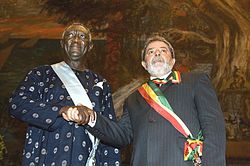| Order of the Star of Ghana | |
|---|---|
 Presidents Lula da Silva with the sash of the Order of the Star of Ghana and John Kufuor with the sash of the Order of the Southern Cross meet in Accra | |
| Awarded by President of Ghana | |
| Type | Order |
| Established | 1 July 1960 |
| Status | Currently awarded |
| Grand Master | President of Ghana |
| Grades | Companion (CSG) Officer (OSG) Member (MSG) |
| Precedence | |
| Next (higher) | Grand Order of the Star and Eagles of Ghana |
| Next (lower) | Order of the Volta |
| Ribbon bar of the order | |
The Order of the Star of Ghana is the second-highest award given by the Government of Ghana to any individual who had helped the cause of the country in one way or the other. Recipients of this award are decorated at a state function, chaired by the President of the Republic. It was the highest national award until 23 June 2008, when it was superseded by the Grand Order of the Star and Eagles of Ghana.